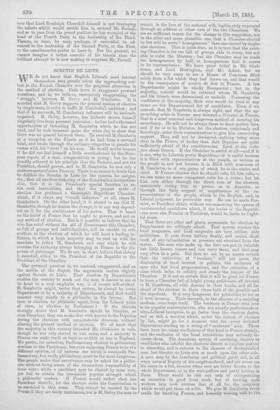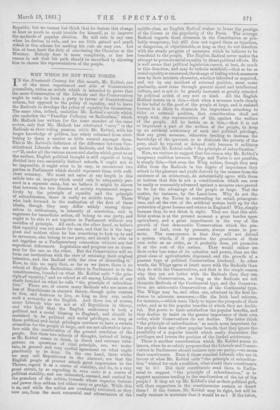SCRUTIN DE LISTE.
AITE do not know that English Liberals need interest themselves very greatly about the approaching con- test in the French Chamber over the proposed alteration in the method of election. Paris loves to exaggerate personal questions, and is, we believe, enormously exaggerating the "struggle " between M. Gravy and M. Gambetta. It is asserted that M. Gravy supports the present system of election by single seats, in order to baffle M. Gambetta's ambition ; and that if he succeeds, M. Gambetta's influence will be seriously impaired. M. Gravy, however, has hitherto shown himself singularly free from personal jealousies ; he has had a thousand opportunities of thwarting M. Gambetta which he has not used, and he took immense pains the other day to show that there was no quarrel between them. He received M. Gambetta at a reception at the Elysae as if he had been a crowned head, and broke through the ordinary etiquettes to parade his rooms with his " rival ' on his arm. He would not be human if he did not feel himself a little overshadowed by the Euro- pean repute of a man comparatively so young ; but he has steadily adhered to his principle that the Premier, and not the President, should govern, and in M. Gambetta he sees only a most competent future Premier. There is no reason to doubt that he dislikes the Scrutin de Lists for the reasons he assigns, viz., that all needless tinkering of the Constitution is objection- able, that it is the President's special function to re- sist such innovations, and that the present mode of election has produced a thoroughly Republican Chamber. which, if it obeys any "occult influence" at all, obeys M. Gambetta's. On the other hand, it is absurd to say that M. Gambetta, though he desires the change, is in any way depend- ent on it for the continuance of his power. That is based on the belief of France that ho ought to govern, and not on any method of election. Nor is it possible to believe that he who has ruled without the aid of Government this Chamber, so full of groups and individualities, will be unable to rule another, in the election of which he will have a leading in- fluence, in which a large majority may be sent up with the mandate to follow M. Gambetta, and over which he will exorcise the authority always belonging in France to the dis- penser of patronage. We do not, in short, believe that victory is essential, either to the President of the Republic or the President of the Chamber.
The personal question is, we contend, exaggerated, and on the merits of the dispute the arguments incline slightly against Scrutin do Liste. That election by Departments enables the country to mark out the man it desires to see at its head in a very emphatic way, is of course self-evident. M. Gambetta might, under that system, be elected by every Department or by a majority of Departments, and that would amount very nearly to a pl4biscite in his favour. But then is election by plebiscite equal, from the Liberal point of view, to election by Parliament ? If the electors strongly desire that M. Gambetta should be Premier, or even President, they can make that wish known to the Deputies during the elections with unmistakable clearness, without altering the present method of election. We all knew that the majority in this country intended Mr. Gladstone to rule, though he was only elected to two seats, and a majority in France can make itself at least as audible as one in England. We prefer, for ourselves, Parliamentary election to phibiscitary election to the Presidency, but even supposing France to be of a different opinion, of all systems one which is nominally Par- liamentary, but really plabiscitary, must be the most dangerous. The people under that contrivance may be asked for a plebis- cite without being aware of the tremendous responsibility of their vote ; while a candidate may be elected by mass veto, yet fail to obtain the irresistible popular strength which
a ;plebiscite confers. If Franco would rather elect her President directly, let the electors order the Constitution to be amended in that sense. They cannot be resisted by the Satiate if they are fairly unanimous, nor is M. Gr6vy the man to
remain in the face of the national will, legitimately expressed through an address or other vote of the two Chambers. We see no sufficient reason for the change in this suggestion, nor in the other and more plausible one, that a Chamber elected by list will be more " homogeneous" than one elected by single- seat elections. That is quite true, as it is true that the exist- ing Chamber is far too full of groups, able to worry, but not able to resist the Ministry ; but the Chamber may be made too homogeneous by half, so homogeneous that it ceases to be representative. Wo have great belief in Mr. Glad- stone, and Lord Hartington, and Mr. Adam, but we should be very sorry to see a House of Commons filled
solely from a list which they had drawn up, and that would be the consequence of scrutis de lists in France. A few
Departments might be wholly Bonapartist ; but in the majority, nobody would be returned whom M. Gambetta and his friends were determined to exclude. Possessing the confidence of the majority, their veto would be fatal to any name on the Departmental list of candidates. Even if we concede that M. Gambetta is always right, and that the ap- proaching crisis in Europe may demand a Dictator in France, that is a most unsound and dangerous method of securing his ascendancy. He will not be always there to draw perfect lists, and if he is to be Dictator, let the electors, consciously and knowingly, order their representatives to give him unswerving support. They will not be disobeyed, nothing being more clear in the France of to-day than that Deputies are quite
sufficiently afraid of the constituencies. Look at the volte- face about Greece. If the Chamber is useful at all—and if it is not, why do Liberals prefer Republics,—it is useful because
it is filled with representatives of the people, as various as the people is, end not because it is filled with nominees of M. Gambetta, or of any group of which he is the centre and
chief. If France chooses that he should rule, let him rule,—
we can name no more competent ruler for a crisis ; but let him rule either through the direct vote of the electors, consciously voting him to power, as in America, or through the daily support or acquiescence of the re- presentatives of the people, which is the English, and, in Liberal judgment, far preferable way. He can be made Pre- mier, or President either, without recommencing the system of recommended candidates which, if the leader of the Republi- cans were also Premier or President, would be liable to fright- ful abuse.
That there are other and grave arguments for election by Departments we willingly admit. That system crushes the local magnates, and local magnates are very seldom able politicians. It puts down bribery finally, and makes short work of any intimidation or pressure not exorcised from the centre. The men who make up the lists can put in valuable but little known names and can carry them, and that may very often be a gain. But then we are by no moans certain that the extinction of "localism" will not mean the diminution of local interest in politics, the exclusion of men who feel local prepossessions, and the extrusion of a class which helps to solidify and steady the temper of the Chamber. It is not so certain that it will be good for France to have a Chamber full of bright young politicians, all devoted. to M. Gambetta, all with dreams in their heads, and all far ahead of the electors in their views both of the possible and
the expedient. It is very dangerous for politicians to act as it were in vacuo. Their strength, in the absence of a resisting medium, over-leaps itself. The tendency in Franco even now is for popular representatives, who are usually professionals or ultra-Liberal bourgeois, to go faster than the electors desire, and so risk a reaction which, under the system of election by list, might go for a moment very far, every irritated Department sending up a string of "moderate" men. There have been too many oscillations of that kind in France already,
and the exclusion of the local notabilities may seriously in- crease them. The American system of confining electors to candidates who inhabit the electoral district is localism pushed to absurdity, and is ruinous to the chances of distinguished men, but Swain do Lists errs as much upon the other side.
A man may be the benefactor and political guide and, in all ways, natural Deputy of his neighbourhood, and yet never see his name in a list, because other men are better known to the whole Department, or to the wire-pullers and party leaders in Paris. There would be risk not only of extinguishing an incentive to good local work, but of turning such workers into men anxious first of all for the notoriety which would put them on a list. We give M. Gambetta every credit for knowing France, and honestly wishing well to the Republic, but we cannot but think that ho desires this change at least as much to avoid trouble for himself, as to improve the methods of popular election. He will rule in any case when he desires to rule, and we see little gained and much risked in this scheme for making his rule an easy one. Let him at least have the duty of convincing the Chamber or the Ministry. Nobody does it more completely, or has less reason to ask that his path should be smoothed by allowing him to choose the representatives of the people.



































 Previous page
Previous page